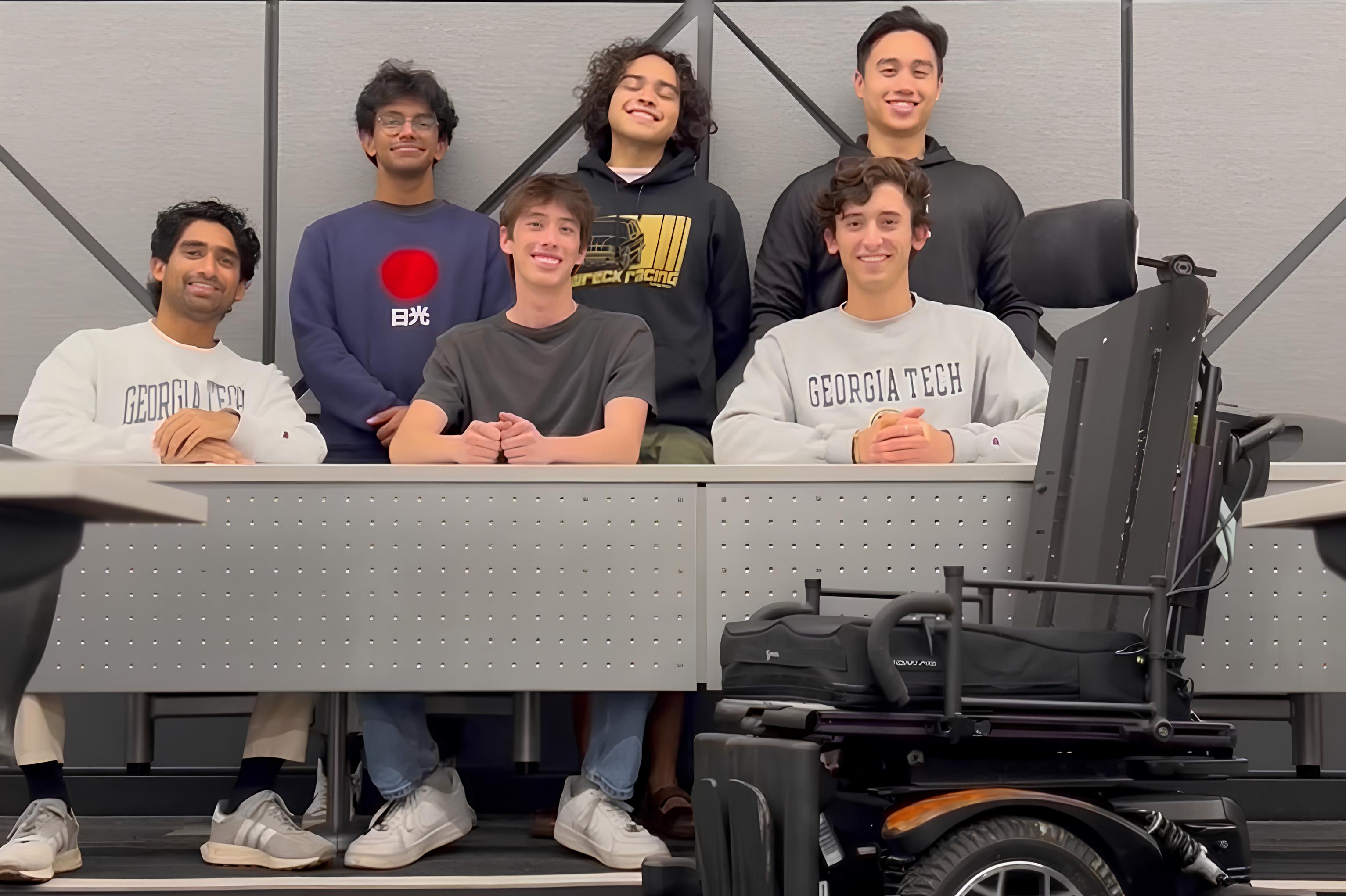
Meet Fall 2023 Capstone Design Team, MechMasters-Carr
November 15, 2023
By Ashley Ritchie
Get to know mechanical engineering Capstone Design team MechMasters-Carr who is designing and developing a protective casing for powered wheelchairs (PWCs) to facilitate seamless loading and unloading by airport ground personnel into commercial aircraft cargo holds, while simultaneously preventing damage to the PWC, for the Fall 2023 Georgia Tech Capstone Design Expo. The team's advisor is Professor Stephen Sprigle.
1. Can you tell us about your team and project?
We are a group of six mechanical engineers working to build a better solution for PWC Travel. Every year, thousands of powered wheelchairs suffer damage during air travel, causing distress and inconvenience to the user. It’s not just about damaged equipment, it’s about taking somebody’s freedom of mobility.
Our solution is to develop a protective casing for PWCs to facilitate seamless loading and unloading by airport ground personnel into commercial aircraft cargo holds, while simultaneously preventing damage to the PWC. The mission is to empower PWC users with the confidence that their chair is safe, every journey, every time.
Team members include:
- Alex Castrejon – Lilburn, GA
- Kenta Davis – Rome, GA
- Jun Yen Lim – Kuala Lumpur, Malaysia
- Donaven Lobo – Kuala Lumpur, Malaysia
- Fernando Sanz – Miami, FL
- Yadu Sunil – Cumming, GA
2. What is your team’s design process, how do you go about separating different tasks, and what are some of the biggest challenges you have faced?
The project itself requires an extremely strong understanding of the daily operations that powered wheelchair users, airlines, and airports frequently go through. Our team put a lot of effort into researching everything about these fields and how they interact with each other in order to determine the most impactful and feasible design for our pod. We were fortunate to work with experts in the field who are actively working to develop PWC standards and accommodations in the airline industry. These included Delta Airport Strategy Specialists, PWC travel bloggers, and even experts who sat on the Congressional Research Committee for a briefing on the Feasibility of Wheelchair Restraint Systems in Aircraft. The product not only requires durable engineering but also an extremely feasible and effective operations plan, which the team explored deeply. Through many rounds of ideation, development, and testing, the team was able to converge on a final design.
We found that the team naturally was able to separate tasks based on our strong suit. Some members have a strong background in design and simulation and were extremely powerful in developing feasible concepts during the design process. Other members are natural leaders and were great in seeing the project from a broad scope and kept the team on track with our decision-making. Some members also had great fabrication backgrounds and excelled in quickly creating prototypes for us to test. Overall, we found that we worked really well with each other and were thankful for everything that we all brought to the table.
With such an in-depth project that works with so many stakeholders, we definitely found challenges in the timeline. It was important to begin developing a design and first prototypes, so we have time to validate our product before the end of Capstone, but it was also important to properly identify our problem and explore as much of the PWC airline travel industry as possible. Many interviews with experts and a lot of team meetings helped us identify where our project should be going.
3. Have there been any highlights while working on your project?
We are extremely proud of the progress we have made in our project. The task at first seemed so daunting but now that we have overcome many of the challenges, we feel extremely prepared for the Capstone Design Expo. A recent highlight in the project was when we completed our first full-scale prototype and were able to test it with many different PWCs. The full-scale prototype allowed us to mimic the operations of ground crews in the airport, which taught the team about what aspects of the pod are working and what can be improved. Getting hands-on with the product that day was extremely insightful and very fun.
4. Can you tell us about your experience working with a sponsor?
Our sponsor, Professor Stephen Sprigle, has previously conducted research on wheelchair users and also works with rehabilitation patients in the Shepherd Center. His experience and background in this field have been valuable to the team. Our sponsor has been able to provide us with extremely valuable contacts that have progressed our project significantly. Because our sponsor is also our faculty advisor, it has been very easy to meet with him on a weekly basis, keeping the team on track with our project.
5. If you could go back in time, what advice or message would you give your team on day one?
Reflecting on our journey, the most important advice I'd give to our team on day one is the strategic management of time. Prioritizing the early completion of assignments not only eliminates stress but also allows our focus to remain steadfast on the core objectives of the project. This class is a conduit for learning the holistic engineering process, from documentation to actual implementation, and mastering the delicate balance between these facets is essential. A more purposeful effort on our planning would likely have mitigated much of the initial semester's pressures, allowing for a smoother progression through the project's milestones.
The Fall 2023 Georgia Tech Capstone Design Expo will be held on Monday, December 4, 2023, at McCamish Pavilion on the Georgia Tech campus. At the Expo, over 600 seniors from various disciplines of engineering and industrial design will showcase their innovative projects designed and built during their Senior/Capstone Design course. Register to attend here!
